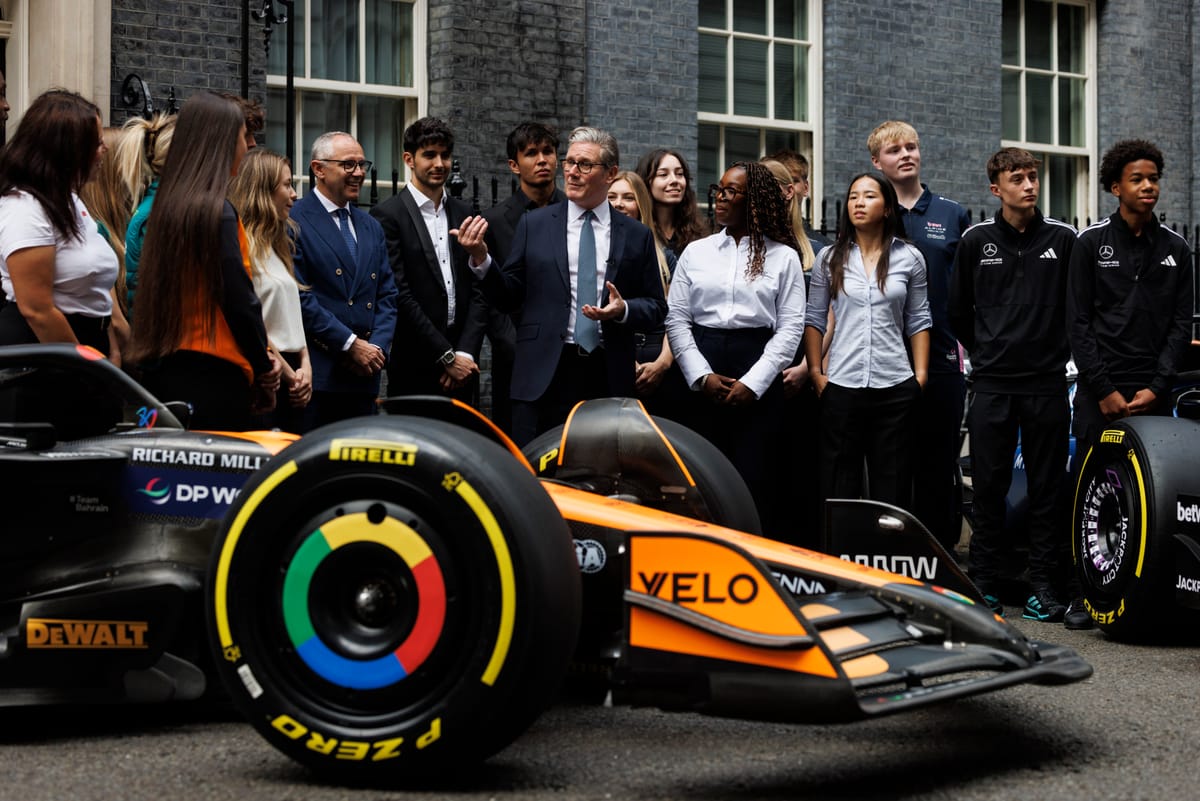Why F1's Downing Street invite mattered

In British Grand Prix week it's not unusual for Formula 1 to cross paths with the government – but this has often been about politicians showing their faces on the grid or presenting trophies on the podium.This year has featured something very different, with the great and the good invited to the inner sanctum at 10 Downing Street on Wednesday for a reception with Prime Minister Keir Starmer to celebrate F1 75 ahead of the Silverstone weekend.The list of guests who gathered in the famous gardens outside the back of the PM's residency was an impressive one.It included current drivers Ollie Bearman, Esteban Ocon, Carlos Sainz, and Alex Albon, plus team bosses Ayao Komatsu, James Vowles, Andy Cowell, Jonathan Wheatley and Flavio Briatore.Other senior figures present included Liberty Media CEO Derek Chang, past champions Jackie Stewart, Damon Hill and Jenson Button, plus F1 Academy boss Susie Wolff and Motorsport UK head David Richards.It may have been a fun afternoon social for many of those present – with plenty of F1 figures posing for photos outside the famous Number 10 door where a Williams and McLaren show car were on display – but there was a much deeper significance to it.While it has often been said that sport and politics should never mix, the world is different now and F1 has rapidly understood that the path to success is not to ignore what governments do, but to embrace them and be a part of change.On the flip side too, governments can no longer ignore the wider impact that F1 is having. And that's no more true than in Britain where the industry employs 6000 people – with 41,000 jobs linked to F1. It totals a £12billion contribution to the UK economy.Speaking in the Downing Street gardens, Domenicali labelled F1 as a "a fantastic business card for this country around the world", with it clear he sees a wider benefit to working in alliance with governments, rather than trying to work around them."Formula 1 can unite and inspire and find solutions that have a real-world impact and that is what I want to continue to push for as the leader of F1," he remarked.What was so important about what happened on Wednesday was that it was the first time that an active British Prime Minister has been so front of stage at an F1 event like this. In the past at similar events deputies or cabinet members had been sent along.F1 had worked super hard to get this important cut through done – as Starmer himself explained why he felt it important to bring people right into the heart of his world."This is the very centre of government," he remarked. "It's where I work every day. It's also my home. It's where I live."So you're very welcome here, and take the fact that we want you here in the heart of government as a statement of intent. We want to celebrate, but we want to also show you how determined we are to support you and everything that you do."Starmer went on to praise the impact the F1 industry has in the country, with 10 of the 11 teams next year (only Ferrari is absent now) having some form of technical base in the UK.He made reference too to the way that technology transfer spreads across industries, and the positive social influences of Mission 44 and F1 Academy."As Prime Minister, I'm really proud of what F1 does for our country - not just that technology, not just that innovation, not just the money into our economy and the sheer joy it gives to so many people, but the soft power and global reputation that it gives the United Kingdom," he said. "And this is really important. It's part of Brand Britain."The weight of a British Prime Minister speaking in these terms about F1 should not be underestimated – both for what it means in putting F1 in a good place for the future, but also in acting as a stimulus for everyone involved.For former F1 team boss Richards, who as chairman of Motorsport UK since 2018 has seen five PMs in that time, the optics of F1 right now are a world away from how things were seen in the past.Let's not forget that often the only times F1 and the British government came into direct contact decades ago was for controversial topics like the banning of tobacco advertising, or Bernie Ecclestone's infamous £1m donation to the Labour Party."You've got to remember, in the old days, we were sponsored mostly by tobacco companies, which the governments were trying to ban," said Richards."We were run by an individual who wasn't paying any tax in the UK, so all the investment was going outside."So it's only now that we're [the UK government] starting to see the depth of car manufacturers coming into the sport and the real solidity of what's been built around F1."From Richards' perspective, hearing Starmer speaking so positively about F1 is nothing but good news for the future.Asked how he felt the government could help F1 the most, Richards said: "Applaud, and promote, and leave us alone. I think recognition is the key thing."The spin off industries that have come from F1 are numerous, and if they recognise those and help those industries, that's what we need."F1 is a great business in itself, and doesn't need anything other than saying: isn't it brilliant, they're all based here, and what a great sport it is."Ultimately, F1 is ticking all the right boxes – and pulling off what it did at Downing Street is just part of the reason it is riding a wave of success in Britain.As Starmer acknowledged, in reference to England's failure to win a football World Cup since 1966: "If you're a big football fan, which I am, we often dream of football coming home and there's a chant that goes along those lines. Well, F1 never left."Ever since 1950, 10 British world champions. That is really incredible. So we're struggling to bring football home, but certainly for F1, it's happening over and over again."















